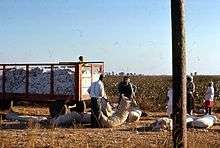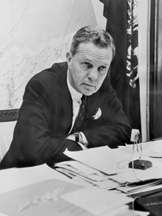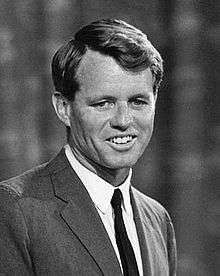Joseph S. Clark's and Robert F. Kennedy's tour of the Mississippi Delta
Senator Joseph S. Clark's and Senator Robert F. Kennedy's tour of the Mississippi Delta occurred on April 10, 1967. At the behest of civil rights lawyer Marian Wright, Clark and Kennedy, together with two other Senators, traveled to Mississippi to investigate reports of extreme poverty and starvation. Following a field hearing, they drove from Greenville to Clarkesdale, stopping and touring impoverished communities as they went. Deeply disturbed by what they saw, the senators returned to Washington D.C. and began pushing for a series of reforms to alleviate the situation. Extensive media coverage of the event exposed the American public to real instances of malnutrition and starvation. The country was shocked and hunger became an important topic nationwide as people began looking for solutions. Efforts by the government and political action groups ultimately resulted in the problem being largely reduced by the 1970s.
Background

In March 1967, the United States Senate Committee on Labor's Subcommittee on Poverty held a series of hearings, as part of the ongoing "War on Poverty." One of the testifying witnesses was Marian Wright, a 27 year-old Yale Law School graduate working with the NAACP's Legal Defense Fund in Mississippi. She told the subcommittee that increased mechanization and requirements that cotton fields lie fallow under federal subsidy stipulations had put thousands of black sharecroppers out of work in the Mississippi Delta.[1] In addition to this, two-parent families were ineligible for many welfare benefits, and most counties in Mississippi had switched welfare programs from one that distributed surplus food to an alternative that required a monthly purchase of food stamps.[2] With little to no income, most households could not produce the necessary funds. As a result, Wright argued, Mississippians were "starving. They're starving, and those who can get the bus fare to go north are trying to go north... I wish that [the senators] would have a chance to go and just look at the empty cupboards in the Delta and the number of people who are going around and begging just to feed their children."[3]
Chairman Joseph S. Clark suggested that the subcommittee travel to Mississippi to verify Wright's testimony. Of the subcommittee's nine members, Senators Robert F. Kennedy, Jacob Javits, George Murphy agreed to the idea and accompanied him. Kennedy dispatched his aide Peter Edelman to get an advanced view on the situation. Edelman spoke extensively with Wright, whom he would marry 15 months later.[2]
Trip to the Delta
The subcommittee members flew into Jackson on April 9. A group of Klu Klux Klansmen heckled Kennedy at the airport. That evening the senators dined with prominent Mississippians, including Oscar Carr and Charles Evers. Carr later described Kennedy as "a very shy man" who "continuously asked questions." Evers said "We talked and talked and he listened."[2] The senator was hosted by local civil rights activist Amzie Moore.[4]
A field hearing took place the next day. Testimony was given about conditions in the Delta from both public officials and local impoverished inhabitants. Kennedy took greater interest in the latter's statements. Afterwards, he told Evers, "I want to see it."[2]
Kennedy's and Clark's tour

The following day Kennedy and Clark drove into the Delta area, while the other senators flew back to Washington D.C. They were accompanied by Evers, Wright, Moore, Edelman, Carr, a dozen or so reporters from state and national newspapers and the Big Three television networks, and an assortment of U.S. Marshals, state highway patrolmen, and local police.[5][6][7] That morning the senators reviewed anti-poverty programs underway in Greenville and a nearby tent city that had been established by striking farm workers. After lunch, Kennedy's and Clark's motorcade traveled at speeds over 80 mph down U.S. Route 61 to visit locations specifically selected by Wright and Moore.[7]
Their first stop was a dilapidated shotgun house in Cleveland, in which 15 people resided. Holes were present in the flooring and roofing, and the only food in the refrigerator was a jar of peanut butter. One boy told Kennedy that all he had for breakfast and dinner was molasses, and that he didn't eat any lunch. Walking to the next house, Kennedy whispered to Edelman, "I've been to third-world countries and I've never seen anything like this."[8]
The following home belonged to a mother of seven. There were no tables or cutlery in the house, and the toilet operated without plumbing. Roaches and rats ran across the floor. Kennedy's attention was drawn to a 20 month-old boy who was playing with rice grains on the floor. The child was covered in sores and bloated from hunger.[9] Kennedy knelt down and stroked his cheek. He said, "My God, I didn't know this kind of thing existed. How can a country like this allow it? Maybe they just don't know."[6] Clark labeled what lay before them a "national disgrace." Kennedy caressed the child and talked to him, but elicited no response. The senator began to cry.[8]
Kennedy stepped outside and quietly remarked, "We spend $75 billion a year on armaments and $3 billion a year on dogs. We have to do more for these children that didn't ask to be born into this." Local newspaper editor Cliff Langford, who strongly disliked Kennedy, shouted back that the two senators were being brainwashed. Clark retorted, "Don't worry. We've been brainwashed from the other side."[7] Langford added, "I don't know of anybody starving down here." Kennedy responded, "Step over here and I'll introduce you to some."[5] Clark reassured the reporters that he and Kennedy were not observing conditions in the Delta to "find fault," but rather "just to see if we can do anything about it."[7]
The senators' motorcade continued on towards Clarkesdale, but Kennedy asked that they stop in the small town of Mound Bayou. With no advanced notice, Kennedy, his aides, and half a dozen reporters walked into the home of a 39 year-old man named Andrew Jackson, his wife, and their six kids.[4][7] There was no electricity, running water, or toilet. There were two pictures in the house; one of the Glorybound Singers (a Clarksdale-based Gospel group) and another of John F. Kennedy.[5] Jackson was incredulous that he was meeting the brother of the late president and asked, "Is you really Mr. Bobby Kennedy?" Kennedy smiled and shook his hand, replying, "Yes. And are you really Mr. Andrew Jackson?"[4]
A thousand people, mostly black school children, awaited the senators outside the Clarksdale Neighborhood Center. Clark climbed on top of a car to announce that their planned press conference was canceled, as their flight in Memphis was due to take off in two hours for the capital and he was "going to catch that plane." Meanwhile, Kennedy had mounted another vehicle and gave a short speech to the crowd. He said he was glad to have made the trip, and told them, "The problems of poverty are problems of all United States citizens." He was shortly thereafter engulfed by people wanting handshakes and autographs, though police soon cleared the way and the motorcade continued onto the highway. The senators had only been in the city for 20 minutes.[7]
Aftermath
Government response
That night Kennedy returned to Washington D.C.. He walked in on his family having dinner at Hickory Hill, highly agitated and, in the words of his daughter Kathleen, "ashen faced." He announced to his children, "In Mississippi a whole family lives in a shack the size of this room. The children are covered with sores and their tummies stick out because they have no food. Do you know how lucky you are? Do you know how lucky you are? Do something for your country."[9]
The following morning Kennedy and Edelman met with Secretary of Agriculture Orville Freeman, and angrily criticized the food stamp program for charging families that had no income.[9] Freeman deflected, "Bob, there isn't anyone in America who has no income." Kennedy replied, "I'll tell you what. I'll send Peter [Edelman] here back down there with some of your people... Will you agree that you'll change the regulations if your people are convinced there really are people in Mississippi who have no income?" Freeman agreed, and was eventually persuaded by incoming evidence to open up access to food stamps.[10]
Returning to New York the next day, Kennedy exclaimed to the wife of one of his aides, "You don't know what I saw! I have done nothing in my life! Everything I have done was a waste! Everything I have done was worthless!"[11] When asked about the Poverty Subcommittee's findings, Clark said that more resources needed to be allocated to the War on Poverty. He also said that the United States needed a "reawakening of a conscience."[7] The entire subcommittee sent a letter to President Lyndon B. Johnson about their discoveries, writing about "conditions of malnutrition and widespread hunger...that can only be described as shocking."[12]
Several Johnson administration officials, in addition to Freeman, were skeptical of the reports of starvation in the Delta. Johnson had seen the news coverage of the event and on April 17 he ordered that his top domestic aide, Joseph Califano, give him a "quick report." Califano replied 20 minutes later, writing that Freeman was hesitant to make major changes to the administration's food stamp program until the original system was sanctioned by Congress.[13] When his aides unanimously approved of an extensive relief plan, Johnson, already uneasy about the food stamp program, rejected the proposal. Kennedy made a direct appeal to Johnson involving increased subsidization of food stamps and the supplement of emergency food rations for 40,000–60,000 of the most impoverished Mississippians. Johnson ignored it, a decision The Nation claimed was due to the fact that he was "incapable of rising above personal politics."[13]
In July, Clark held another set of congressional hearings on the issue, attracting widespread media coverage.[14] The hearings were tense with Clark, Kennedy, Javits, and testifying medical observers frequently clashing with Mississippi Senators John Stennis and James Eastland (both staunch segregationists), and Mississippi Board of Health officer A. L. Gray.[15] Kennedy called renowned Child Psychologist Robert Coles to testify on poverty's effect on children in the Mississippi Delta.[9] One North Carolina doctor described "an unwritten policy on the part of those who control the State to eliminate the Negro Mississippian either by driving him out of the State or starving him to death." When Stennis and Eastland accused the doctor of libel against the welfare workers of their state, he invited them and other state officials to go see conditions for themselves, to which none accepted. On the second day of proceedings Secretary Freeman and Senator Javits got into a shouting match, with the senator arguing that the secretary should disregard local authorities' opinions, declare an emergency, and immediately supply food to the region. He remarked, "We seem to be able to send airplanes to the Congo in a terrible hurry. We first heard of the desperation point of poor Mississippi Negroes 18 months ago... and we are still hearing that there is starvation in Mississippi."[15] Kennedy openly expressed his frustration with Johnson administration officials' perceived inability to understand the extent of the Delta's problems and other bureaucratic complications, saying, "It seems to me we are floundering around a great deal."[16]
In the end, Kennedy managed to amend the renewal of the Economic Opportunity Act of 1964 to include provisions for a national survey on nutrition. Stennis was so embarrassed by the hearings that he proposed a $10 million emergency fund be established for food and medical services.[10] Despite resistance from other Southern legislators and a lack of support from President Johnson, Stennis' bill passed.[16] The Senate also voted unanimously to create a Select Committee on Nutrition and Human Needs.[17] The Poverty Subcommittee held further field hearings across the country as part of its work.
Public reaction
The media coverage from the event brought national attention to the food insecurity issues in the Delta. Most Americans were shocked by the conditions described in the area. Almost immediately, the Field Foundation of New York dispatched a team of doctors to Mississippi to examine children and verify the senators' findings.[17] They labeled the conditions they observed a "national disaster," documenting cases of Kwashiorkor, Rickets, and other signs of malnutrition and starvation.[10] One doctor likened state of affairs to the worst he had seen in eastern Kenya.[15] This countered initial public reactions of disbelief at the severity of the situation. The Citizens Crusade Against Poverty, an advocacy group already studying the problems in the Delta, quickly created a "Citizens' Board of Inquiry into Hunger and Malnutrition in the United States." In April 1968, the board published a report of its findings, entitled Hunger U.S.A.. This was shortly followed by a critique of the National School Lunch Program by a coalition of women's organizations.[17]
In conversation with Wright and Edelemen, Kennedy remarked, "The only way there's going to be change is if it's more uncomfortable for Congress not to act than it is for them to act...You've got to get a whole lot of poor people who just come to Washington and stay here until[...]Congress gets really embarrassed and they have to act." The following week Wright proposed the idea to Martin Luther King Jr., who subsequently organized the Poor People's March on Washington.[18] Around the same time CBS broadcast a major documentary, Hunger in America, which had been made on the suggestion of Kennedy to Don Hewitt.[19]
Legacy
The trip to the Mississippi Delta had made hunger a public issue in the United States.[17][20] Following the revelations of food insecurity, a powerful anti-hunger movement emerged in the country and worked to reform food assistance programs while proposing new ones. Federal expenditures on food assistance grew by 500 percent over the next decade.[21] Marian Wright would later say that the episode "set in motion a chain of events that culminated in years later in the virtual elimination of hunger in America during the Nixon years."[10]
See also
Citations
- ↑ Shesol 1998, p. 329
- 1 2 3 4 Schlesinger Jr. 2002, p. 794
- ↑ Tye 2016, p. 348−349
- 1 2 3 Wilkie 2002, p. 169
- 1 2 3 Tye 2016, p. 350
- 1 2 Schlesinger Jr. 2002, p. 795
- 1 2 3 4 5 6 7 Wilkie 2014
- 1 2 Tye 2016, p. 349
- 1 2 3 4 Thomas 2013, p. 339
- 1 2 3 4 Tye 2016, p. 351
- ↑ Schmitt 2011, p. 179
- ↑ Eisinger 1998, p. 78
- 1 2 Shesol 1998, p. 330
- ↑ Eisinger 1998, p. 77
- 1 2 3 Ferris 2014, p. 294
- 1 2 Schmitt 2011, p. 182
- 1 2 3 4 Maurer & Sobal 1995, p. 19
- ↑ Schlesinger Jr. 2002, p. 873
- ↑ Raphael 2010, p. 40
- ↑ Poppendieck 1999, p. 10
- ↑ Poppendieck 1999, p. 11
References
- Eisinger, Peter K. (1998). Toward an End to Hunger in America. Brookings Institution Press. ISBN 978-0-8157-9124-9.
- Ferris, Marcie Cohen (2014). The Edible South: The Power of Food and the Making of an American Region (illustrated ed.). UNC Press Books. ISBN 978-1-4696-1768-8.
- Maurer, Jeffrey; Sobal, Donna (1995). Eating Agendas: Food and Nutrition As Social Problems. Social Problems and Social Issues. Transaction Publishers. ISBN 978-0-202-36576-3.
- Poppendieck, Janet (1999). Sweet Charity?: Emergency Food and the End of Entitlement (reprint ed.). Penguin. ISBN 978-0-14-024556-1.
- Raphael, Chad (2010). Investigated Reporting: Muckrakers, Regulators, and the Struggle over Television Documentary. History of Communication. University of Illinois Press. ISBN 978-0-25209-220-6.
- Schlesinger Jr., Aurther Meier (2002). Robert Kennedy and His Times (reprint ed.). Houghton Mifflin Harcourt. ISBN 978-0-618-21928-5.
- Schmitt, Edward R. (2011). President of the Other America: Robert Kennedy and the Politics of Poverty (illustrated ed.). Univ of Massachusetts Press. ISBN 978-1-55849-904-1.
- Shesol, Jeff (1998). Mutual Contempt: Lyndon Johnson, Robert Kennedy and the Feud That Defined a Decade (illustrated ed.). W. W. Norton & Company. ISBN 978-0-393-31855-5.
- Thomas, Evan (2013). Robert Kennedy: His Life. Simon and Schuster. ISBN 978-1-4767-3456-9.
- Tye, Larry (2016). Bobby Kennedy: The Making of a Liberal Icon. Random House Publishing Group. ISBN 978-0-679-64520-7.
- Wilkie, Curtis (2002). Dixie: A Personal Osyssey Through Historic Events That Shaped the Modern South. Simon and Schuster. ISBN 978-0-7432-2604-2.
- Wilkie, Curtis (2014). Assassins, Eccentrics, Politicians, and Other Persons of Interest: Fifty Pieces from the Road. Univ. Press of Mississippi. ISBN 978-1-62674-297-0.

